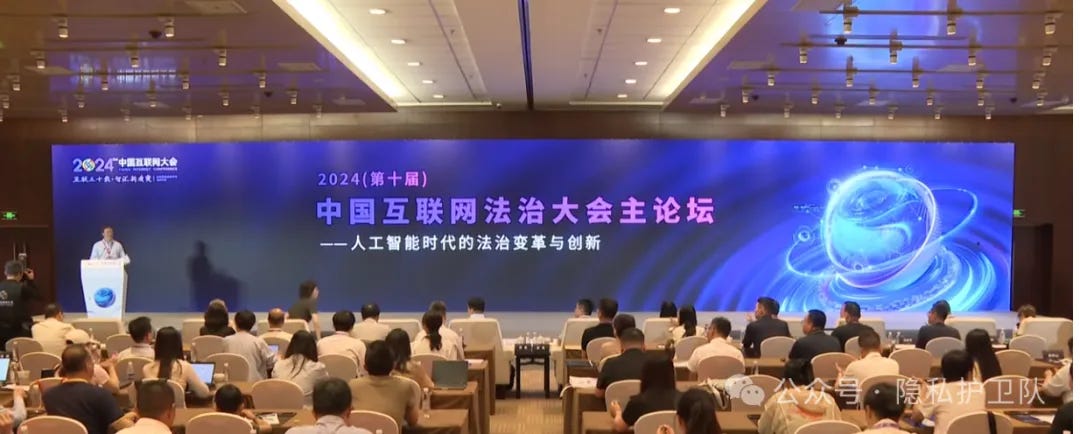On July 11, the main forum of the 2024 China Internet Rule of Law Conference (the CIULC, 2024中国互联网法治大会), themed "Legal Reform and Innovation in the Era of Artificial Intelligence," (人工智能时代的法治变革与创新) was held in Beijing. Notably, Wang Hongyu (王洪宇), Director of the Research Office of the Legislative Affairs Commission of the National People's Congress Standing Committee(全国人大法工委研究室), attended the event and delivered a keynote speech on the legislation of China's AI law.
According to the "State Council's 2024 Legislative Work Plan" issued by the General Office of the State Council in May this year, the "Draft Artificial Intelligence Law" has once again been included as a preparatory project for submission to the Standing Committee of the National People's Congress for deliberation. This marks the second consecutive year since 2023 the law appeared in the State Council's legislative plan.
For those unfamiliar with the CIULC, it is an annual conference that discusses legal issues and governance challenges related to the technology sector. It is perhaps the most prestigious conference in the field of tech legislation in China. Every summer, government officials, legal experts, scholars, and industry leaders from China's tech sector gather here to discuss the latest developments and future trends in tech law and regulation. Senior officials from the Standing Committee of the National People's Congress, the State Council, and relevant ministries often attend the conference and deliver keynote speeches, sharing the Chinese government's latest policies and trends in tech governance.
Unlike experts and scholars, Wang's position lends authority to his speech. His participation and public address at such events must be approved by the Legislative Affairs Commission of the NPC, effectively representing the institution's voice. This speech also provides the most complete and clear explanation to date of the basic principles and legislative ideas for China's future AI law from the top lawmaking body responsible for drafting it, allowing us to glimpse the basic outline of the coming Chinese AI law.
Another aspect that left a strong impression on me was that, as a legal officer focused on domestic legislative affairs, Wang dedicated a significant portion of his speech to discussing the different paths of AI legislation in China, the United States, and the European Union, and their implications for industrial development. He also frequently mentioned the relationship between AI legislation and “major power competition”.
In his speech, Wang listed five types of challenges brought by AI: intellectual property; liability; network security, personal information and data protection; ethics and morality. He believes that while the early stages of AI development undoubtedly carry risks, there is no need to over-worry or exaggerate these risks. Over-pursuing safety could hinder technological development, leading to stagnation and loss of global competitive advantage.
Wang also revealed the basic principles currently guiding the legislation of China's AI law: balancing development and security, recognizing that “not developing is the most splendid insecurity” (不发展就是最大的不安全). Legislation and regulation should be used to shape industrial development advantages and unleash the vitality of AI technology and industry. China should not blindly follow other countries but should base its legislation on national conditions and China's strategic framework for participating in major power competitions. Careful consideration should be given to protecting national security interests, promoting industrial transformation and upgrading, safeguarding citizen rights, and ensuring social justice.
Based on these principles, Wang further elaborated on the legislative ideas for the AI law: inclusiveness, prudence, and phased approach.
Prioritize the flexible application of existing legislative rules through legal or judicial interpretation to address prominent legal issues arising during AI development, such as fair use of intellectual property in large model training.
For specific application scenarios, local governments or the State Council should authorize legislation, as seen in China's legislative practice in intelligent connected vehicles.
Address pain points and complex issues affecting industrial development in areas urgently requiring legal regulation through "small, fast, and nimble" (小快灵) legislation or by amending existing laws.
Meanwhile, Wang emphasized that China's AI law should be well-coordinated with other laws:
Align with the Personal Information Protection Law, Cybersecurity Law, and Data Security Law.
Balance general and special legislation. Different scenarios have varying requirements for risk classification, qualification requirements, and liability allocation rules. General AI legislation should focus on common and fundamental legal issues in the AI field and ensure coordination with other legislation.
To prevent serious criminal activities such as the abuse of AI that infringe on individual rights, disrupt social order, or endanger national security, appropriate adjustments to the criminal law should be considered.
Following the basic principles and legislative ideas described by Wang, I believe that China's AI law will not be formally enacted for at least the next 2-3 years. However, this does not mean China's legislative and regulatory authorities will remain inactive. Unlike in cybersecurity and data security, the AI industry will likely encounter guidelines, norms, principles, and framework ideas more oriented towards soft law. Wang's reference to the UK's 1865 "Red Flag Act" in his speech is quite interesting, highlighting the lessons learned from this historical legislation on the development of the British automotive industry. In my view, all these remarks gave us some signals about China’s upcoming AI regulatory style. The importance of future AI safety regulatory standards and their guidance value to the private sector will far exceed that of principles and vague laws. I believe this represents the essence of inclusive, prudent, and agile governance(包容审慎、敏捷治理), incorporating the best elements of governance paths from the United States and the EU, taking into account the need for the global tech competition, and it is the correct path.
Here is the full transcript of Wang's speech that I recorded. All faults are mine:
Keep reading with a 7-day free trial
Subscribe to Geopolitechs to keep reading this post and get 7 days of free access to the full post archives.




